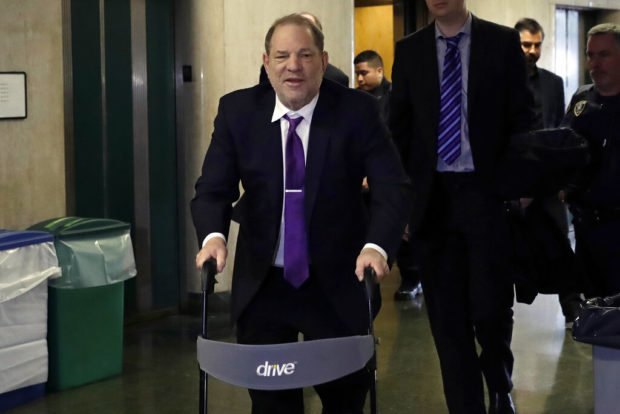Back on stand, Harvey Weinstein accuser declares: ‘He is my rapist’

NEW YORK — A day after breaking down in tears, a key accuser at Harvey Weinstein’s trial returned to the witness stand Tuesday and endured a final day of withering cross-examination focused on the complex nature of their relationship, defiantly telling jurors: “I want the jury to know that he is my rapist.”
The woman was back in a New York City courtroom for a third day as Weinstein’s lawyers finished an exhaustive review of friendly, sometimes flirtatious emails she sent the film producer after she says he raped her twice in 2013.
They also played a recording she made of herself telling a psychic in April 2014 that Weinstein “had tried to cross boundaries in my life but I don’t allow him to.”
Weinstein’s lawyers contend that evidence points to a consensual relationship and shows that the 34-year-old former actress was a manipulator who grin-and-bared her way through sexual encounters with Weinstein because she enjoyed the perks of knowing him.
“I know the history of my relationship with him,” she pushed back. “I know it was complicated and difficult. But that doesn’t change the fact that he raped me.”
Asked by Weinstein lawyer Donna Rotunno how many times they had consensual sex, the woman responded: “I only remember intercourse the times that he raped me.”
Cross-examination took up most of the woman’s time on the witness stand.
She finished up direct testimony back on Friday and prosecutors decided not to ask her any additional questions once Rotunno was finished Tuesday afternoon.
One reason the defense has focused so much attention on the woman is because her allegations that Weinstein raped her at a Manhattan hotel in March 2013 are the basis for some of the most serious charges at issue in his trial.
The woman has alleged Weinstein raped her again several months later at a Beverly Hills hotel, though she said she is not sure if she will pursue charges there.
The woman’s return to the witness stand followed an emotional episode Monday, when she sobbed while reading an email passage about being abused earlier in her life. It was part of an email she sent a boyfriend in May 2014 explaining her relationship with Weinstein. The judge halted proceedings when she was unable to continue.
The Associated Press typically does not publish the names of people alleging sexual assault unless they give their consent. The AP is withholding the name of the woman because it isn’t clear if she wishes to be identified publicly.
Resuming questioning on Tuesday, Rotunno asked the woman about several times she saw Weinstein after the alleged rapes, including her acceptance of his invitation to an Oscars party in 2015 and her decision to meet him in 2016 in his room at the same Beverly Hills hotel where she alleges he previously raped her.
After the 2016 hotel encounter, the woman emailed Weinstein saying, “I feel so fabulous and beautiful. Thank you for everything.”
She told jurors that Weinstein “was being really nice to me” at that time, but said she couldn’t remember if they had sex on that occasion. Weinstein, now 67, was married at the time to fashion designer Georgina Chapman.
At one point, Rotunno asked the woman why she would accept favors from “your rapist.” That’s when the woman turned to jurors and said: “I want the jury to know that he is my rapist.”
While dozens of women have accused Weinstein of sexual assault or harassment, he is on trial in New York for allegations involving just two episodes with two women: the woman testifying Tuesday and a former film and TV production assistant, Mimi Haleyi, who alleges he forcibly performed oral sex on her in 2006. Weinstein’s downfall energized the #MeToo movement.
As big a factor as Tuesday’s witness is in the case, the defense’s painstaking cross-examination, coupled with her emotional reaction on Monday, could run the risk of alienating jurors and making her appear more sympathetic.
Defense lawyer Brian McMonagle found himself navigating the same murky waters on the way to winning a mistrial because of a hung jury in Bill Cosby’s first molestation trial in 2017. Cosby was later convicted.
“Of course a lawyer has to go in there and attack credibility and attack inconsistencies,” said McMonagle, who’s not involved in the Weinstein case. “It’s just how you do it. There’s a way to do it without being despicable.”
On Tuesday, the jury was shown a series of nude photos of Weinstein taken by the district attorney’s office a few weeks after his arrest, presumably to try to corroborate claims by the woman he’s charged with raping that she noticed “extreme scarring” on his body. She testified last week that along with the scars, she thought he had characteristics of both male and female genitalia.
Jurors also heard from another supporting witness: an actress who testified that she felt pressured into having an awkward three-way sexual encounter with Weinstein and the woman.
Emanuela Postacchini testified that in February 2013, Weinstein had her meet him and the rape accuser at a Los Angeles-area hotel, where he tried to persuade the women to have sex with him.
Postacchini said during the encounter, Weinstein’s accuser went into the bathroom and was “crying in the fetal position on the ground.” Postacchini said that while she personally didn’t feel forced to do anything, “the situation was forced.” NVG
RELATED STORIES:
At Harvey Weinstein’s trial, a big role for other accusers